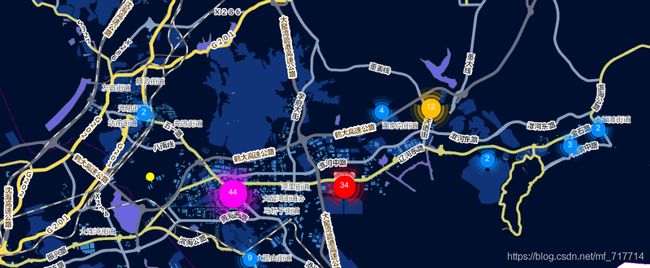arcgis api for javascript 4.12 vue 点聚合(2)
这是我第二篇关于vue使用arcGis点聚合的文章,第一篇比较繁琐,写的时候也是半懂,这里对其简化,有些功能也省去,所以想看上一篇的,这里有链接arcgis,使用的插件依旧是FlareClusterLayer(插件链接)
1,首先看下效果
2,引入插件
引入插件的方式,上一篇已经介绍,这里简单说一下,
- 引入插件需要使用绝对地址,打包后需要注意地址引入的方式
- 在public/index.html中引入插件
- 使用script,不要加 type=“text/javascript”
<script>
var dojoConfig = {
async: true,
tlmSiblingOfDojo: false,
packages: [{
name: "fcl",
location: '<%= BASE_URL %>fcl/'
}],
has: {
"esri-promise-compatibility": 1
}
};
</script>
3,源码
<template>
<div id="container">
<div class="view" id="views"></div>
</div>
</template>
<script>
import {loadModules} from 'esri-loader'
import nodesData from './data.json'
export default {
name: 'HelloWorld',
data() {
return {
map: 'http://47.110.60.95:6080/arcgis/rest/services//测试/MapServer?f=jsapi',
m1: require('@/assets/m1.png'),
m2: require('@/assets/m2.png'),
m3: require('@/assets/m3.png'),
m4: require('@/assets/m4.png'),
vueArcGis: {
ClassBreaksRenderer: null,
SpatialReference: null,
PopupTemplate: null,
fcl: null
},
newArcGis: {
map: null
}
}
},
methods: {
async initLayer(data) {
// 设置点聚合大小
const renderer = this.createClusterRenderer();
// 配置属性
const options = {
clusterRenderer: renderer,
spatialReference: new this.vueArcGis.SpatialReference({
"wkid": 4326
}),
displayFlares: false, // 是否显示聚合子类,即环绕周围的小圆圈
clusterRatio: 200, // 设置每个集群边界的大小
data: data
}
const clusterLayer = new this.vueArcGis.fcl.FlareClusterLayer(options);
this.newArcGis.map.add(clusterLayer);
},
createClusterRenderer() {
let defaultSym = this.createPointSymbol([255, 255, 0], 'circle', 10, [255, 255, 0], 1);
let renderer = new this.vueArcGis.ClassBreaksRenderer({
defaultSymbol: defaultSym
});
renderer.field = "clusterCount";
const smSymbol = this.createPictureSymbol(this.m1, '53px', '53px');
const mdSymbol = this.createPictureSymbol(this.m2, '70px', '70px');
const lgSymbol = this.createPictureSymbol(this.m3, '80px', '80px');
const xlSymbol = this.createPictureSymbol(this.m4, '100px', '100px');
renderer.addClassBreakInfo(0, 10, smSymbol);
renderer.addClassBreakInfo(11, 20, mdSymbol);
renderer.addClassBreakInfo(21, 40, lgSymbol);
renderer.addClassBreakInfo(41, Infinity, xlSymbol);
return renderer
},
createPictureSymbol(url, width, height) {
return {
type: "picture-marker",
url, width, height
};
},
createPointSymbol(color, style, size, outlineColor, outlineWidth) {
return {
type: "simple-marker",
style: style,
color: color,
size: size,
outline: {
color: outlineColor,
width: outlineWidth
}
};
},
createSimpleFillSymbol(color, style = 'solid', outlineColor, outlineWidth) {
return {
type: "simple-fill",
style,
color,
outline: {
color: outlineColor,
width: outlineWidth
}
}
}
},
mounted() {
loadModules([
"esri/Map",
"esri/views/MapView",
"esri/layers/MapImageLayer",
"esri/renderers/ClassBreaksRenderer",
"esri/geometry/SpatialReference",
"fcl/FlareClusterLayer_v4",
"esri/PopupTemplate"
])
.then(([Map, MapView, MapImageLayer, ClassBreaksRenderer, SpatialReference, fcl, PopupTemplate]) => {
this.vueArcGis = {
ClassBreaksRenderer, SpatialReference, PopupTemplate, fcl
};
const mapLayer = new MapImageLayer({url: this.map}) // 底图地图
const map = new Map({
layers: [mapLayer]
});
const mapView = new MapView({
map: map,
container: "views",
center: [121.8192766890, 39.0565858993], // 大连 中心点
scale: 164521
});
mapView.ui._removeComponents(["attribution"]); //去掉logo
mapView.ui.move(["zoom"], "bottom-right"); // 缩放控件移动到右下方
mapView.when(() => {
const allPoints = []
for (const key in nodesData) {
const {x, y = null} = nodesData[key]
if (x && y) {
allPoints.push({
x, y, key
})
}
}
this.initLayer(allPoints);
});
this.newArcGis = {map}
})
.catch(() => {
// handle any errors
//console.error(err);
});
}
}
</script>
<style>
#container, .view {
width: 100vw;
height: 100vh;
padding: 0;
margin: 0;
}
</style>
4,data数据
const nodesData = []
for (var i = 1; i < 100; i++) {
nodesData.push({
"x": 121.8192766890 + readomX() * i* 0.01,
"y": 39.0565858993 + readomY() * i * 0.001,
})
}
function readomX() {
return Math.round(Math.random());
}
function readomY() {
return Math.round(Math.random());
}
